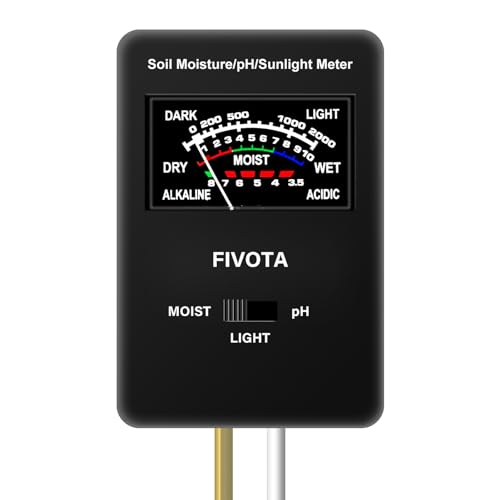This article was reviewed by Steve Snedeker, professional landscaper.
Making a pot of coffee every day gives you access to a fantastic source of organic matter. Your used coffee grounds might just become the secret weapon in your gardening arsenal.
Wondering if this matter would be liked by your fruit trees? Let's get into the science behind it and explore the beauty of re-purposing coffee grounds, giving them a second life in your garden.
Coffee grounds are more than mere waste; they could be the unexpected nourishment your fruit trees are needing. The benefits they can offer are varied:
- Acidity Adjustment: Coffee grounds can help bring down the soil pH, perfect for those acid-loving trees.
- Slow-Release Fertilizer: Acting as a slow-release fertilizer, they help in maintaining consistent growth.
- Mulch: Utilized as mulch, they work wonders in preserving soil moisture.
- Drainage: Coffee grounds enhance soil drainage, promoting a healthier root system.
- Aeration: They assist in soil aeration, essential for plant health.
- Moisture Retention: They bolster soil water retention, aiding in proper hydration.
- Nitrogen Nourisher: They enrich your compost with nitrogen, a key plant nutrient.
- Earthworm Attractor: Coffee grounds can increase your earthworm population, contributing to natural soil health.
However, not everything about coffee grounds is as trouble-free as it seems. There might be some elements within that could pose potential threats to your fruit trees:
- Caffeine Concerns: Caffeine can hinder seedling growth and suppress root development.
- Bacterial Battleground: The antibacterial properties may potentially harm beneficial bacteria in your soil.
Continue reading to learn about each of these benefits and harmful effects of ground coffee on your fruit trees as well as how to use them properly in the garden.
This practical guide will help you use your morning pick-me-up in ways you never imagined before.
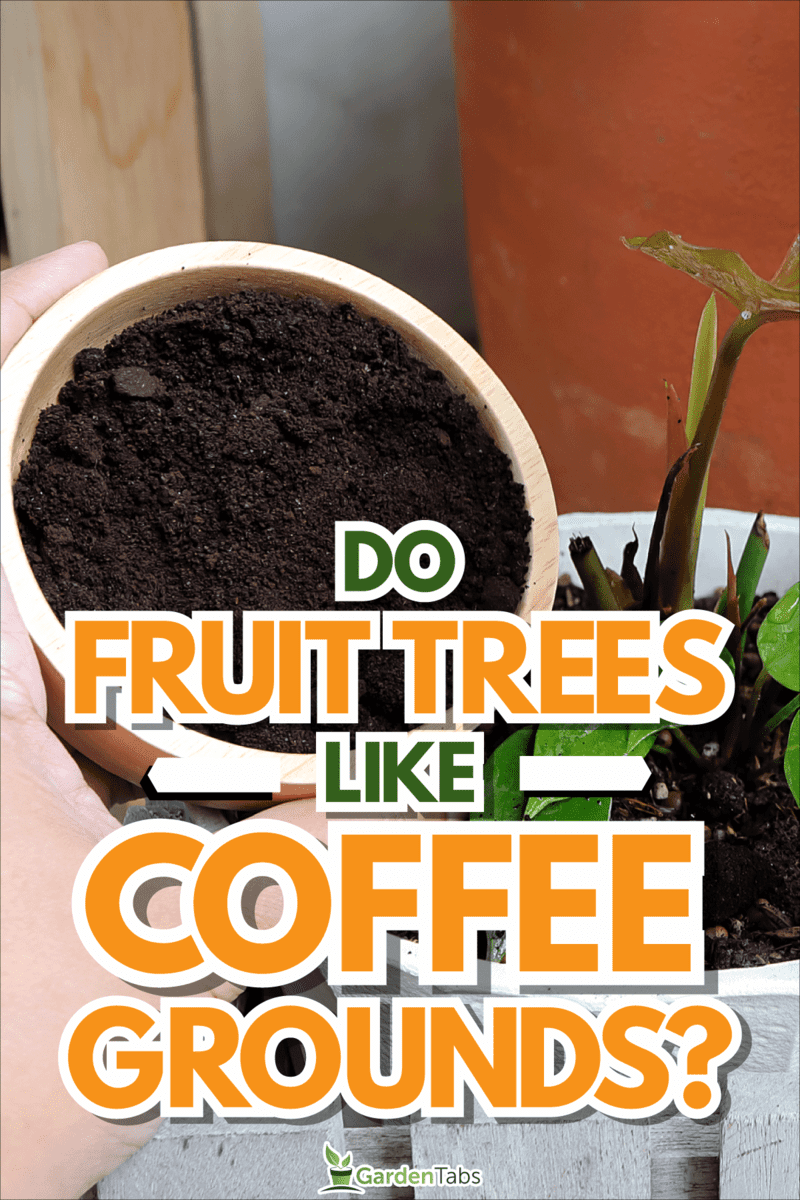
What Can Fruit Trees Benefit From Coffee Grounds?
It's crucial to understand the advantages of any amendments before adding them to the soil of your garden.
You don't want to supply too much of one nutrient or make the soil too acidic, after all. Below are the benefits that the coffee grounds may bring to your fruit trees.
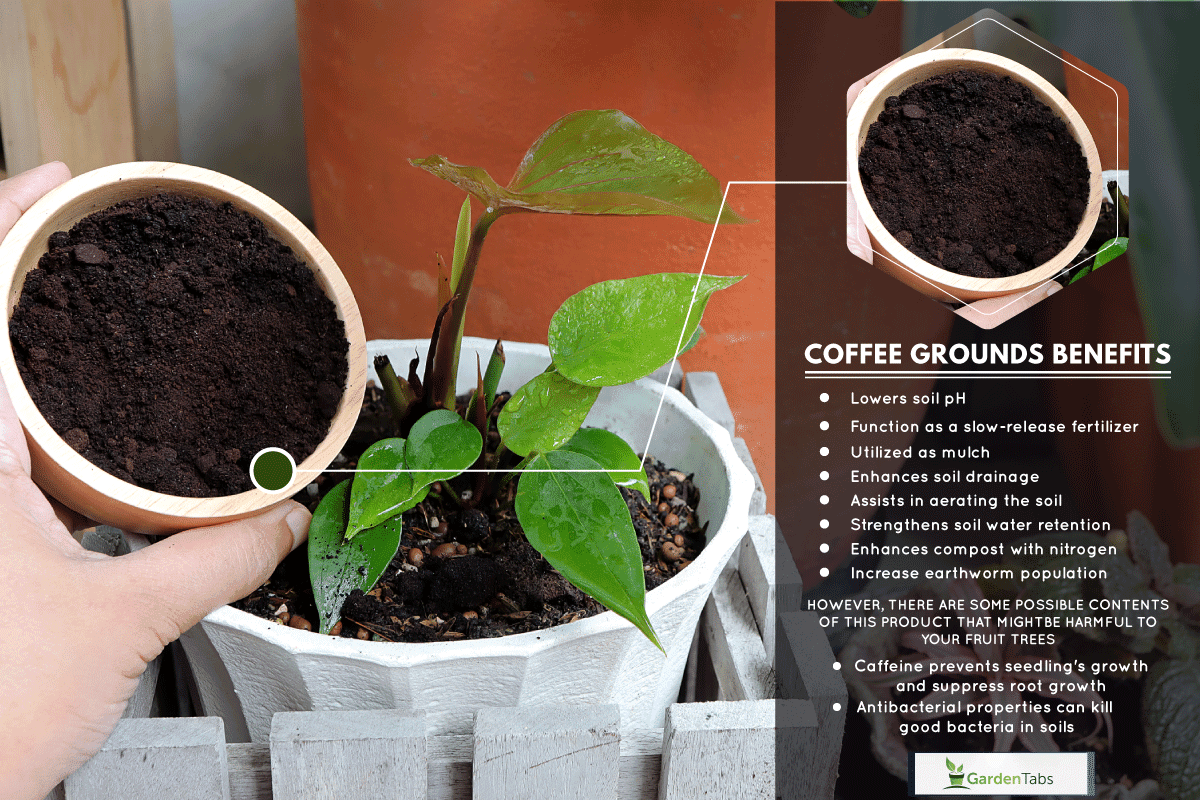
Lowers Soil pH
Coffee grounds lower pH or increase the acidity of the soil as it has a pH of 5.5-6.8. But only for coffee grounds that haven't been washed. Acidity characterizes newly ground coffee.
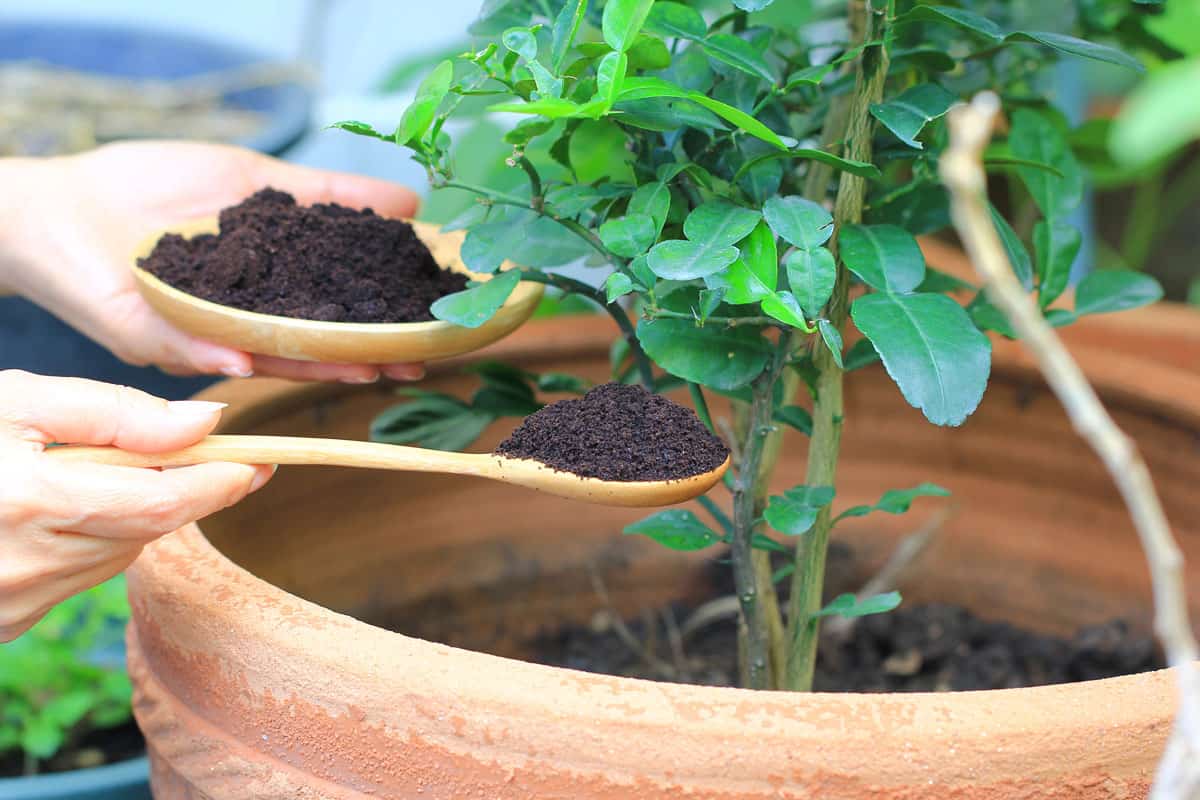
It's neutral to use used coffee grounds. Your used coffee grounds won't affect the soil's acidity if you rinse them because they have a pH of 6.5, which is close to neutral.
This is only beneficial to those plants that love acidic soil such as fruit trees that prefer a soil pH of 6-7.
Function As A Slow-release Fertilizer
Coffee grounds are slow-releasing nutrients to your soil which make it an effective fertilizer.
Used coffee grounds have a good amount of nitrogen, low levels of potassium and phosphorus, and a few other micronutrients.
Adding these nutrients to your soil will be advantageous because they are all necessary for plant health.
They are excellent as a gradual fertilizer because they will not immediately be available to the plant's roots and will release gradually throughout the breakdown cycle of the coffee grounds.
Utilized As Mulch
Mulch made of coffee grounds and other organic materials, like shredded leaves, can be applied to gardening.
This can help prevent water from evaporating from the soil, as well as help the soil retain heat in the winter and keep cool in the summer when it is layered over the top of the soil around plants. Also, inhibit weed growth.
However, you can only use coffee grounds as mulch if you combine them with another organic material.
If you use them alone, the small particles will become compact and prevent water from reaching the soil.
Enhances Soil Drainage
Since used coffee grounds are an organic material, adding a few cups of them to your soil regularly can be a good way to amend it and help improve soil quality.
Your soil's drainage will be improved by adding more organic material, preventing water from pooling around plant roots, and rotting the roots, which will help prevent disease.
There is no reason not to use your coffee grounds for this purpose since they might otherwise end up in the trash. Moreover, every gardener is aware of how important good drainage is for the health of the majority of plants.
The only guideline for adding coffee grounds to improve drainage is to ensure that they are thoroughly incorporated into the soil.
The very small particles that make up coffee grounds can become compacted if they are not thoroughly mixed with other ingredients. This will actually create barriers related to clay-like soil, which is the exact opposite of what you want to happen.
Assists In Aerating The Soil
It will aid in aerating the soil, much like how adding coffee grounds to the ground will improve drainage.
This is due to the fact that adding any organic matter to the soil will help to improve aeration, enabling roots to more effectively absorb moisture and nutrients and enhancing plant health in general.
Strengthens Soil Water Retention
Coffee grounds are a type of organic matter, which means that adding them to your soil will help it retain water and generally improve the health of the soil.
Because the soil will stay moist for a longer period of time after rain or irrigation, this will especially benefit plants that prefer to grow in moist soil.
Soil that retains water well will also require less watering, which can save energy and cut down on water usage.
Enhances Compost With Nitrogen
Coffee grounds contain a reasonable amount of nitrogen, which will break down and produce compost that is high in essential nutrients. Despite the fact that it is brown in color, coffee grounds can be added to compost as green waste.
Utilizing compost made of coffee grounds will help your plants' foliage thrive because nitrogen helps to promote lush, leafy growth.
Increase Earthworm Population
Using coffee grounds in your soil or compost can boost the number of worms because they are reportedly a popular worm food.
For the health of plant roots and to aid in the decomposition of compost, your garden needs to have a healthy worm population.
Coffee grounds are famously a favorite food of vermicomposters' worms. So regularly adding this material to your compost will keep the worms content and active.
What Harm Can Coffee Ground Do To Fruit Trees?
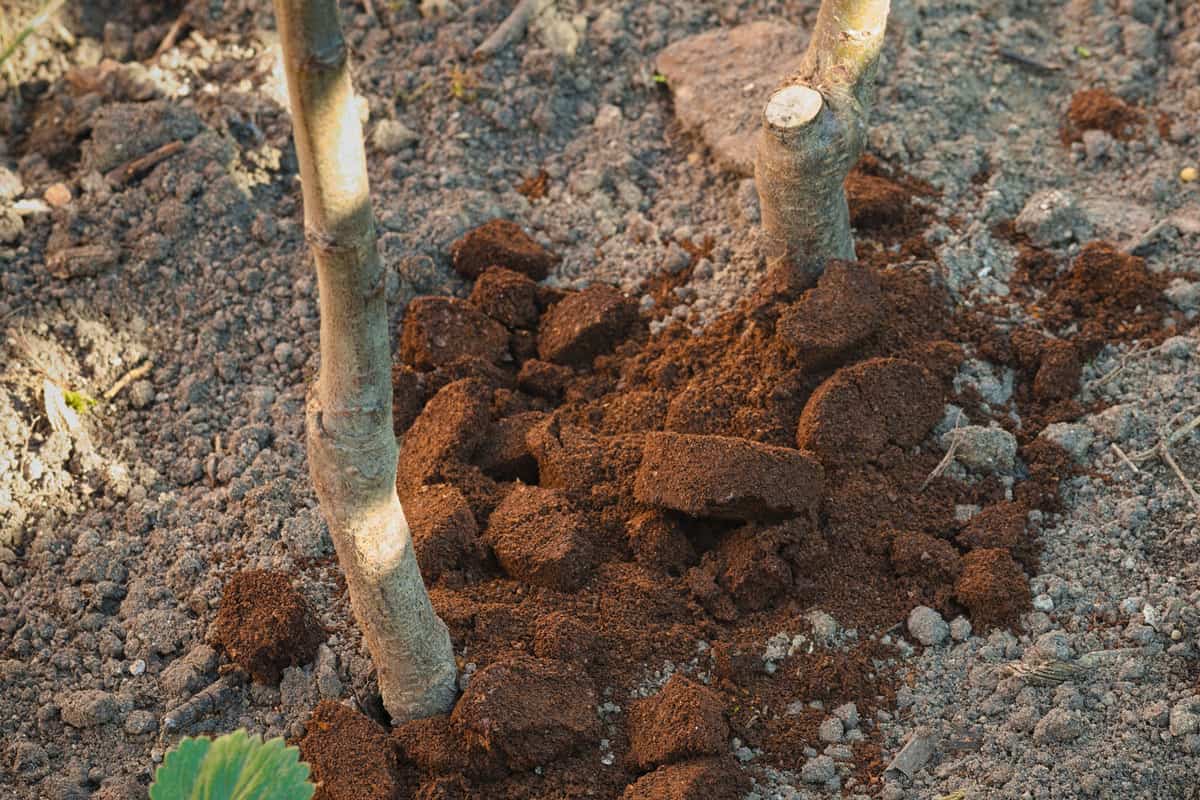
Aside from the benefits that the coffee ground may bring, the following are the properties of this coffee that may harm your fruit trees.
Caffeine Prevents Seedling's Growth And Suppress Root Growth
We all know coffee contains caffeine. In fact, one of the reasons coffee plants grow well is because the caffeine they contain prevents nearby competition from flourishing. Caffeine can prevent seedlings from growing.
As a result, you should keep coffee grounds away from fruit trees seeds or young plants if you are growing them. They may obliterate the plant's roots, killing it before it has even had a chance to grow.
Moreover, caffeine can have detrimental effects on mature plants. It may limit root development and result in stunted growth of the plant.
Although mature plants are less likely to be harmed by coffee grounds than seedlings are, it is still worth thinking about if you don't want to jeopardize the health of fruit trees you particularly like.
However, there is typically not much caffeine left in used coffee grounds. Used coffee grounds typically have much less caffeine and a pH of 6.8, whereas unused coffee grounds have a lot of caffeine and a more acidic pH of 5.5–6.8.
This demonstrates that used coffee grounds have largely lost their caffeine and acidity during the brewing process, and their residual nutrients (such as nitrogen) are a great addition to the health of the soil.
Antibacterial Properties Can Kill Good Bacteria In Soils
Antibacterial properties exist in coffee. Although this is viewed as a benefit in general life, it can actually lead to serious issues with soil health. In soil, there are a variety of beneficial bacteria that control disease and pests.
By adding an antibacterial substance, you will eliminate all of the beneficial bacteria that make soil susceptible to pests and disease in the future.
The destruction of beneficial bacteria will also change the soil's natural biodiversity, which can lead to a variety of issues for earthworms and other organisms living there.
How To Use Ground Coffee As Fruit Tree Fertilizer?
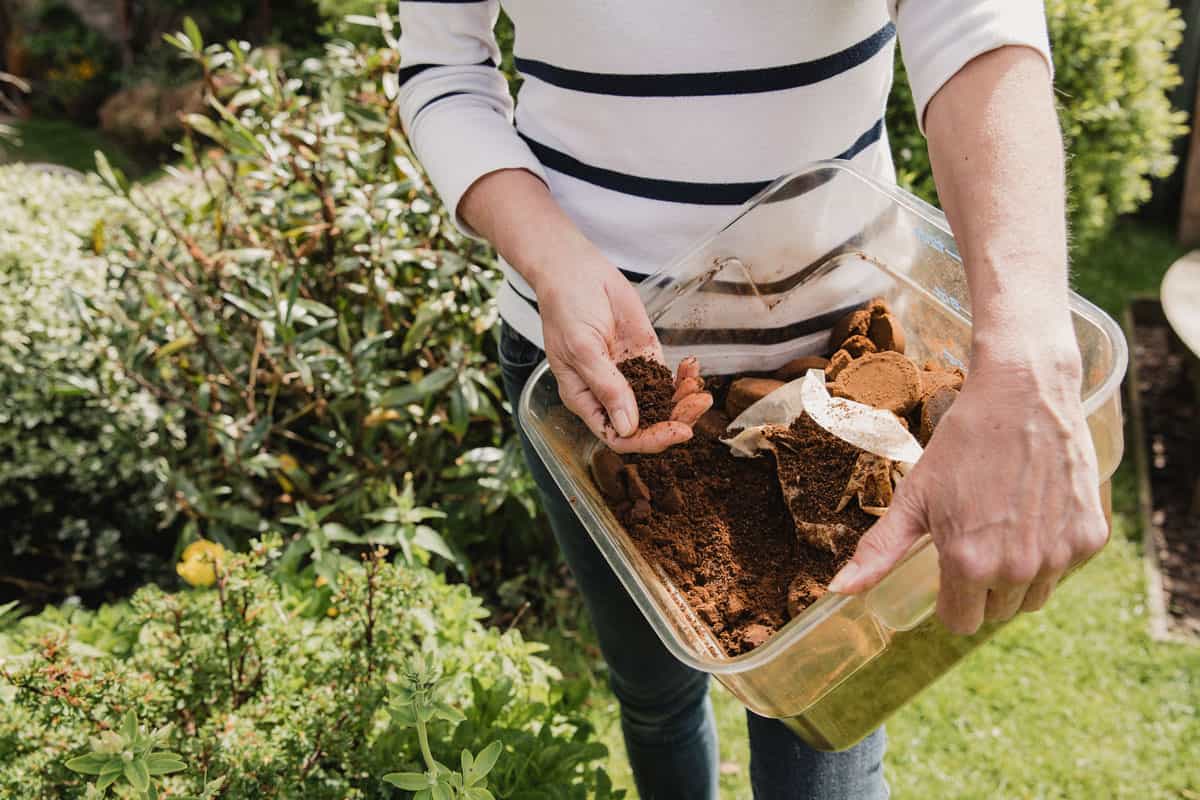
There are three ways to add coffee grounds to the soil around your fruit tree. The methods are direct application, mixing with mulch, and composting.
In general, you're fine using a small amount of coffee grounds on the soil's surface. Just keep in mind that touching the tree's trunk with it could spread disease. Good spacing is to keep the ground at least 3 inches away from the trunk.
To prevent the coffee grounds from clumping and preventing the soil from absorbing water and air, spread the grounds out over the soil using a rake as well.
Coffee grounds that are clumped and wet can actually introduce mold to the soil or the tree.
On the other hand, if you have a lot of coffee grounds, think about composting them or combining them with mulch. Mulches like pine needles, bark, or leaves are some of the options.
How Much Coffee Ground Should You Use On Fruit Trees?
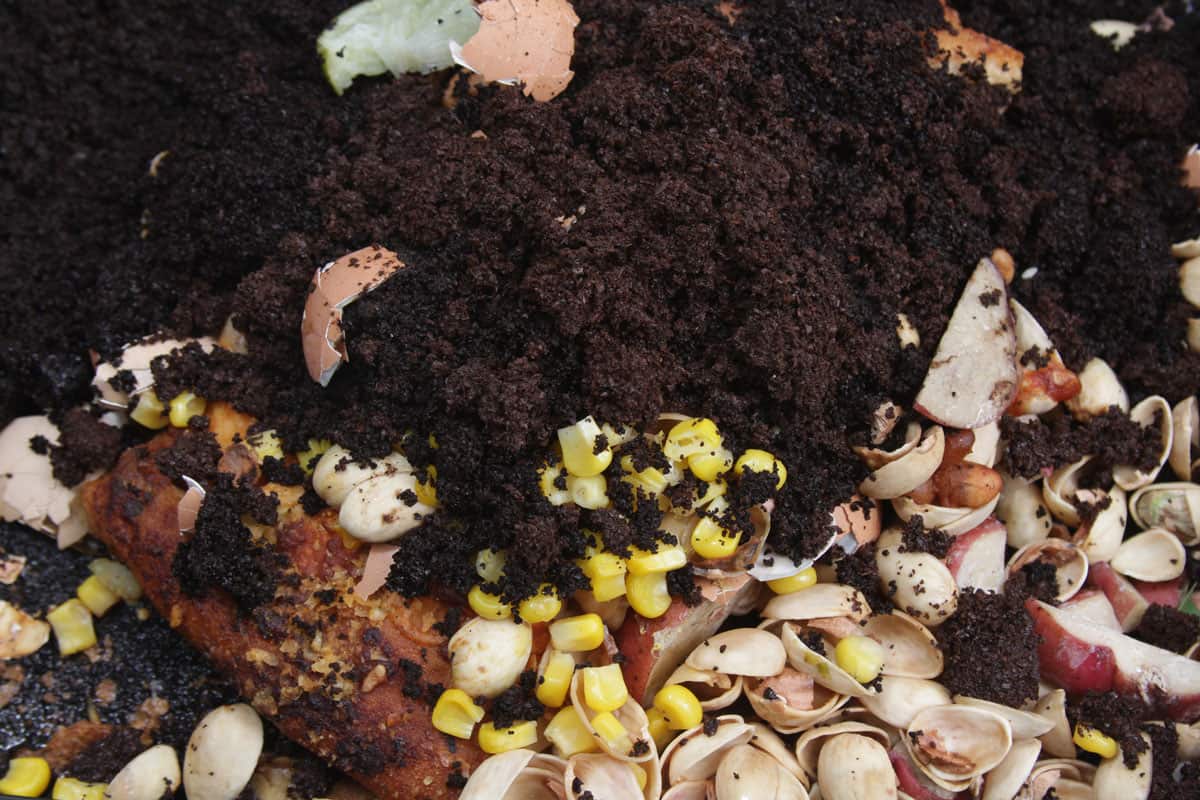
Keep the used coffee grounds around 15-20 percent of the total soil or compost, as a general rule.
Coffee grounds have a small surface area and can decompose quickly; however, if used in excess, they can overwhelm the soil and harm fruit trees. Leaves and other carbon-rich, brown materials should still be present in the soil.
You can use a soil pH meter to see if the soil is becoming too acidic if you're worried that you're adding too many coffee grounds to the soil of your fruit tree.
Conclusion
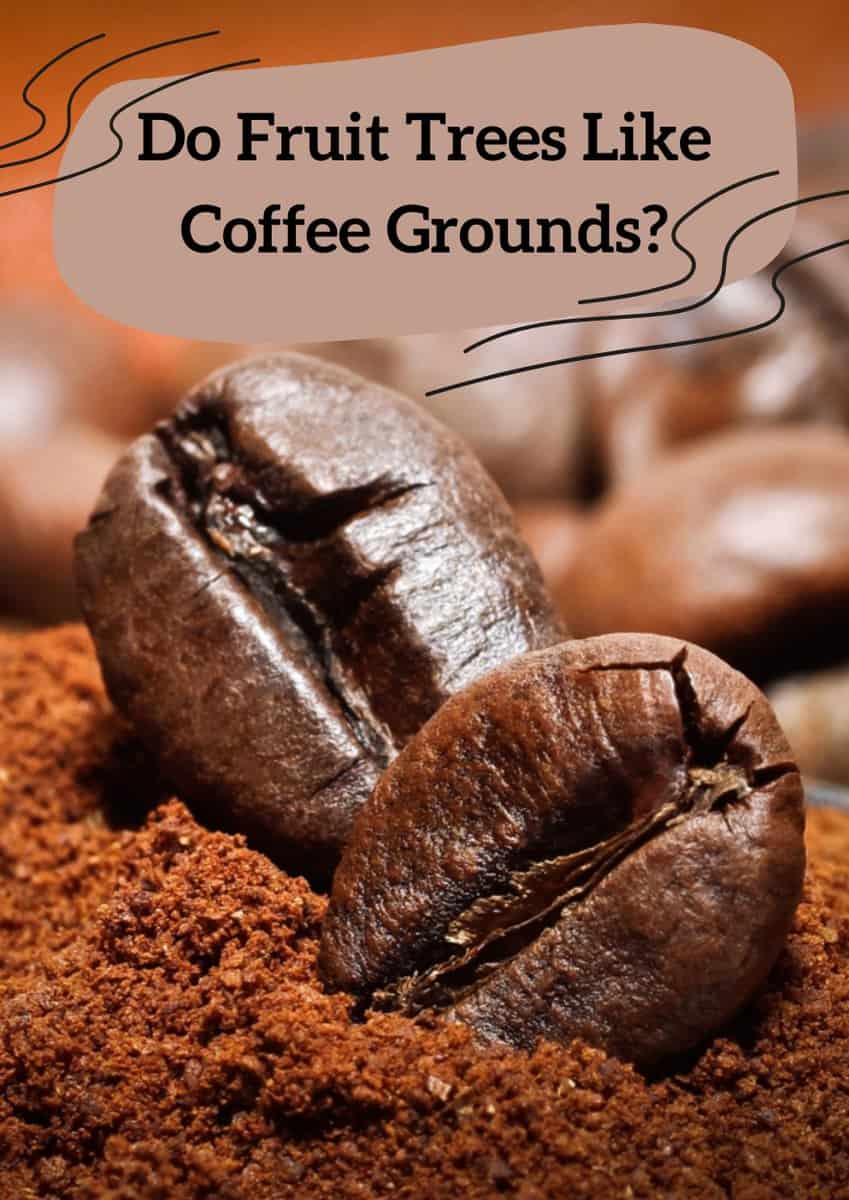
Although there are many benefits and few harmful effects of applying coffee grounds to your fruit trees. The environment you're planting your fruit trees into will determine whether coffee grounds or any other amendment is best for them.
If you’re planning to use coffee grounds, follow the instructions above to avoid any possible problems with growth and fruit production. Happy gardening!
The following articles might be as enjoyable to read if you loved this article:


